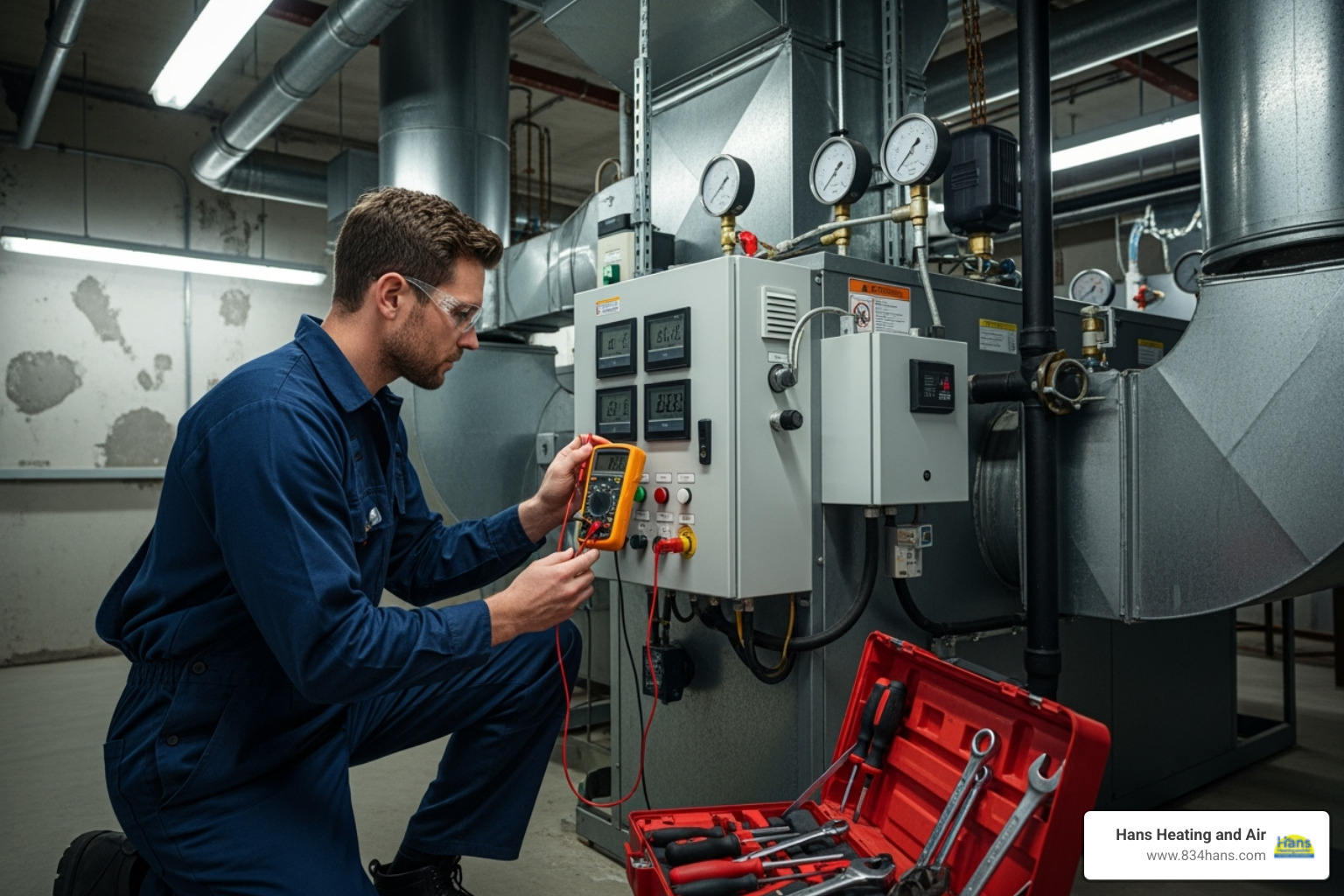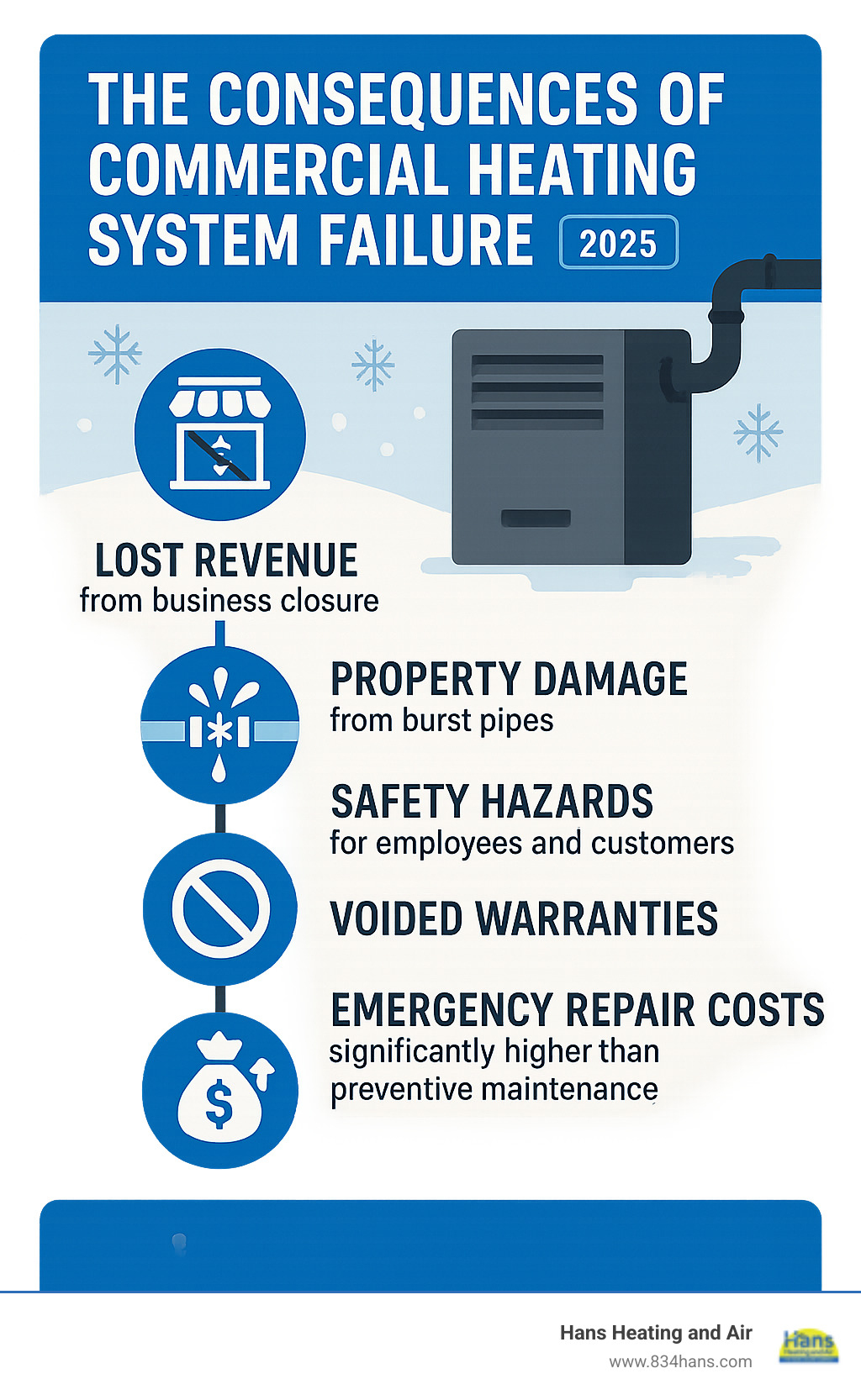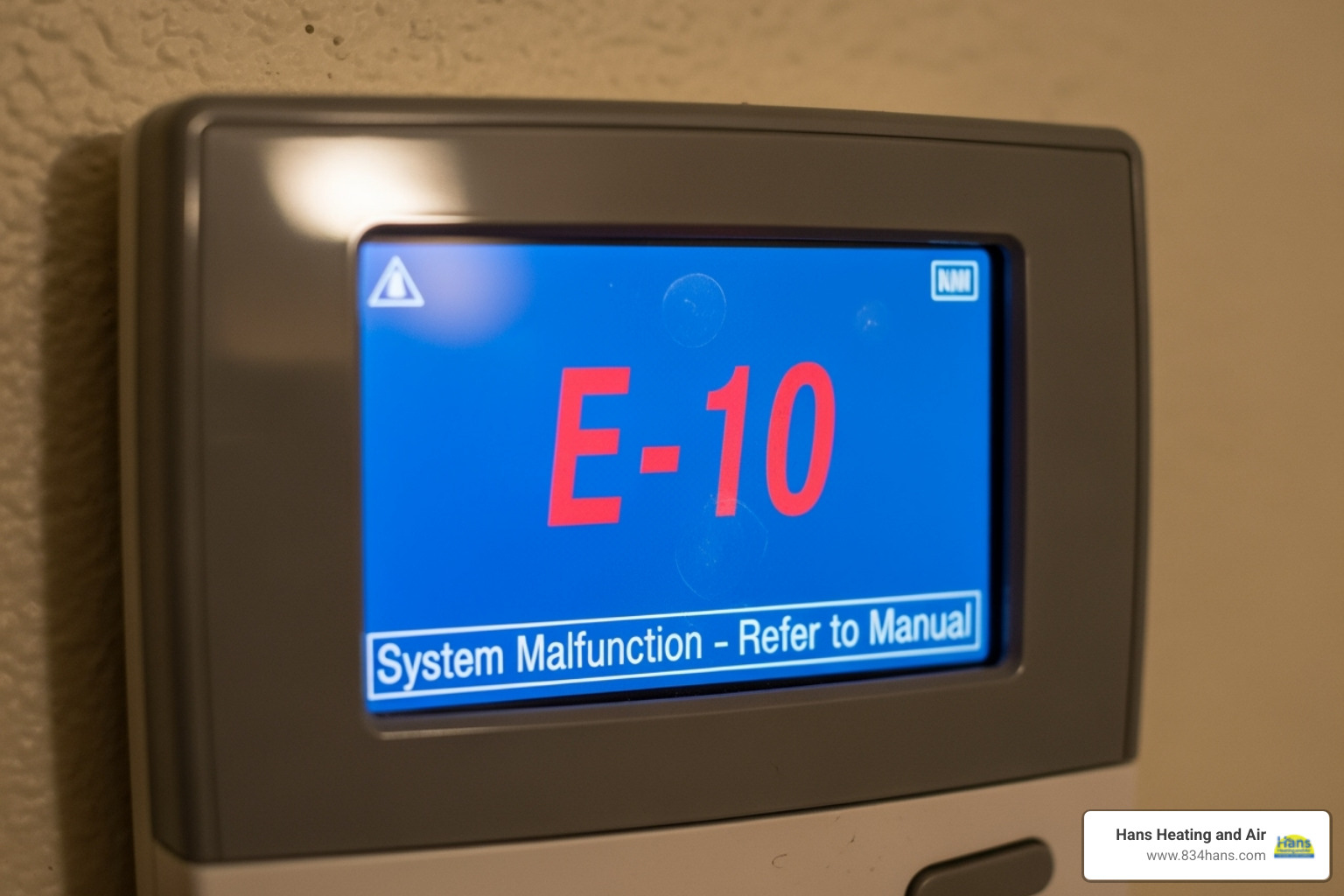Don't Get Left in the Cold: How to Pick a Commercial Heating Repair Company
Why Your Business Can't Afford to Ignore Commercial Heating Issues

Commercial heating repair is crucial for maintaining business operations, protecting property, and ensuring safety in cold weather. When your heating system fails, it's not just about comfort—it's about keeping your doors open.
Quick Commercial Heating Repair Checklist:
- Annual maintenance required to prevent costly breakdowns
- 15-year average lifespan for commercial furnaces and boilers
- Natural gas most common fuel type for commercial systems
- Emergency service available 24/7 from qualified contractors
- Warranty protection requires yearly professional servicing
Your commercial heating system works harder than residential units, heating larger spaces for longer hours. That's why choosing the right repair company isn't just about fixing problems—it's about protecting your entire business.
For instance, a business faced burst pipes when its heating failed in winter, leading to expensive repairs, downtime, and lost revenue.
Commercial furnaces and boilers can last 15 years, but only with proper maintenance. Skipping yearly service can void your warranty and even force a temporary closure because the space is too cold for staff and customers.

Understanding Your Commercial Heating System
Your commercial heating system is the heart of your business in winter. Ignoring its warning signs is a risk you can't afford. Understanding your system is the first step toward proper commercial heating repair and maintenance.
Common Commercial Heating System Types
Every commercial building has unique heating needs, which is why different systems exist.
Forced-air furnaces are workhorses that heat air and push it through ductwork. Most run on natural gas and are popular for heating spaces quickly.
Hot water boilers heat water for steam or hot water that travels through pipes to radiators. They provide steady, even heat, making them ideal for large buildings.
Packaged rooftop units (RTUs) are all-in-one systems for heating, cooling, and ventilation that sit on your roof. They save interior space and simplify maintenance.
Variable Refrigerant Flow (VRF) systems are cutting-edge technology. They can heat one zone while cooling another, offering precise control and significant energy savings.
| System Type | Best For | Average Cost Range | Maintenance Needs |
|---|---|---|---|
| Furnace | Small to medium offices, retail spaces | Moderate | Annual filter changes, yearly tune-ups |
| Boiler | Large buildings, consistent heating needs | Higher initial cost | Annual inspections, water quality monitoring |
| RTU | Warehouses, single-story buildings | Moderate to high | Rooftop access required, seasonal maintenance |
Key Factors Influencing System Lifespan
A commercial heating system lasts about 15 years on average, but several factors influence this.
Regular maintenance is crucial. An annual professional service, ideally before winter, catches small problems early and prevents costly failures.
Quality installation is foundational. A properly sized and calibrated system installed by a professional will perform better and last longer.
Usage patterns matter. A system running 24/7 will wear out faster than one in a small office. This should be factored into your maintenance schedule.
Environmental factors like dust, extreme weather, or corrosive air (like salt air near coasts) can shorten a system's lifespan.
Equipment quality is key. Investing in reliable equipment from reputable manufacturers typically results in fewer repairs and a longer service life.
With proper care, your commercial heating system can reliably serve your business for years. Understanding your system helps you know when to call for professional help.
Recognizing the Red Flags: When to Call for Commercial Heating Repair
Imagine employees in winter coats at their desks or dealing with frozen pipes and water damage. These business nightmares are often preventable by recognizing your heating system's warning signs before it shuts down completely.
Telltale Signs Your System Needs Attention
Your system usually gives hints before it fails. Here’s what to look for:
- Uneven heating: When some areas are hot and others are cold, your system is struggling to distribute heat. This could be due to ductwork issues or failing components.
- Strange noises: Banging, grinding, or squealing sounds are cries for help. Don't ignore new noises from your HVAC system.
- Skyrocketing energy bills: A sudden increase in your utility bills without a change in usage means your system has lost efficiency and is working overtime.
- Frequent cycling: If your system turns on and off repeatedly, it's "short cycling." This is inefficient and puts extra strain on the equipment.
- Poor air quality: Increased dust, unusual odors (especially burning smells), or stuffiness can indicate a problem with filtration or ventilation.
- Visible leaks or damage: For boilers, any water leak is an immediate red flag. For any system, rust or corrosion means it's time to call for commercial heating repair.
- Thermostat issues: If your thermostat is unresponsive or shows error codes, the problem could be the unit itself or its connection to the heating system.

The Dangers of Delaying Commercial Heating Repair
Ignoring these signs can be dangerous and expensive.
- Complete system failure: This often happens at the worst possible time, like during a cold snap, leading to emergency service costs.
- Burst pipes: When heating fails, pipes can freeze and burst, causing extensive water damage that can shut down your business.
- Fire hazards: Neglected electrical issues can overheat and become a serious fire risk.
- Carbon monoxide risks: A cracked heat exchanger in a gas furnace or boiler can leak this deadly, odorless gas.
- Voided warranty: Most manufacturers require annual maintenance to keep warranties valid. Neglect means you could pay for expensive repairs out-of-pocket.
- Lost business revenue: Uncomfortable customers, unproductive employees, or a forced closure all hit your bottom line hard.
When your system starts showing signs of trouble, it pays to listen. Commercial heating repair is about protecting your business, employees, and peace of mind.
The Repair Process: What to Expect from Costs to Consequences
When your commercial heating system has issues, knowing the repair process can reduce stress. Here’s what to expect from the service call to the final fix.

The diagnostic process is the first step. A technician uses specialized tools to pinpoint the root cause of the problem. Once diagnosed, you'll receive an explanation and repair options. The repair timeline depends on the complexity and parts availability. Simple fixes may take hours, while major replacements could take a day or more.
For urgent situations, our emergency services are available 24/7, because some failures can't wait.
The True Cost of Commercial Heating Repair
Several factors influence the final cost of your commercial heating repair.
- Labor rates: This reflects the specialized knowledge required to fix complex commercial systems.
- Parts cost: Costs vary from an inexpensive sensor to a major component like a heat exchanger.
- System accessibility: Units in hard-to-reach areas require more time and effort to service safely.
- Repair complexity: A simple calibration costs less than a multi-step component replacement.
- Emergency service fees: These apply for immediate help outside of normal business hours.
- Time of year: Demand for technicians is higher during peak season, which can affect scheduling.
Why Neglecting Maintenance Leads to Higher Costs
Skipping maintenance to save money usually backfires.
- Minor issues escalate: A simple adjustment can become a major repair if ignored.
- Reduced efficiency: Your system works harder, increasing energy bills and shortening its lifespan.
- Catastrophic failure: A neglected system can fail completely, leading to emergency costs and business disruption.
- Premature replacement: Systems should last about 15 years, but neglect can cut that to 8-10 years, forcing an early, expensive replacement.
- Business disruption: Lost productivity and revenue from an uncomfortable or closed business add to the costs.
The math is simple: regular maintenance costs a fraction of major repairs. It's about preventing problems, not just fixing them.
Proactive Care: Maximizing Efficiency and Longevity
Like an annual physical, your commercial heating system needs a yearly check-up. This preventative care is essential because commercial heating repair becomes far less frequent when you're proactive. An ounce of prevention can save you thousands of dollars.
The Benefits of a Regular Maintenance Schedule
Committing to annual professional service provides significant benefits:
- Improved energy efficiency: A clean, calibrated system runs optimally, lowering your utility bills.
- Extended equipment lifespan: Well-maintained systems often last beyond the 15-year average.
- Fewer unexpected breakdowns: Regular service catches small issues before they become emergencies.
- Improved safety: Technicians check for carbon monoxide leaks and other safety hazards.
- Better air quality: Clean filters and systems provide healthier air for your employees and customers.
- Warranty protection: Most manufacturers require professional maintenance to keep your warranty valid.

When you do need replacement parts for maintenance or repairs, quality matters. You can Find quality replacement parts from trusted suppliers to keep your system running at its best.
How to Ensure Your System is Energy-Efficient
Beyond annual tune-ups, you can take other steps to manage energy costs:
- Programmable smart thermostats: These allow you to set different temperatures for different times, saving energy when the building is unoccupied.
- Regular filter changes: Dirty filters restrict airflow, forcing your system to work harder. Check them monthly.
- Sealing ductwork: Leaky ducts waste heated air. Proper sealing can dramatically improve efficiency.
- Upgrading to high-efficiency models: If your system is old, a new, efficient model can offer significant long-term energy savings.
- Annual professional tune-ups: A trained technician can spot and fix efficiency issues you might miss.
Proactive maintenance allows you to focus on what you do best—running your business.
How to Choose the Right HVAC Contractor
Choosing a partner for your commercial heating repair needs is a critical decision. You need a trustworthy contractor who understands commercial needs and is available for emergencies. The right choice protects your investment and keeps your business running smoothly.
Essential Credentials to Look For
When evaluating HVAC companies, verify these credentials:
- Licensed and insured: This is non-negotiable. Licensing ensures competency, and insurance protects you from liability.
- Certified technicians: Look for certifications from industry organizations, which indicate up-to-date training.
- Years of experience: Seek out contractors with specific experience in commercial HVAC, as these systems are more complex than residential ones.
- Positive customer reviews: Read comments from other businesses to gauge reliability, professionalism, and quality of work.
- Checking credentials with organizations like the Better Business Bureau (BBB): A good rating indicates the company handles business professionally.
Questions to Ask a Potential HVAC Company
Interview potential contractors with these questions:
- "Do you offer 24/7 emergency service?" This is crucial for any business, as breakdowns don't follow a 9-to-5 schedule.
- "What brands do you service?" A good contractor should be able to service all major commercial brands.
- "Do you offer maintenance plans?" The best contractors are proactive and offer plans to prevent problems, often with perks like priority service.
- "Can you provide references?" Reputable companies will gladly provide references from other commercial clients.
- "What are your warranty terms?" A solid warranty on parts and labor shows confidence in their work.
At Hans Heating and Air, we understand that choosing an HVAC contractor is about finding a partner who cares about your business. We're proud to serve Montgomery, Hope Hull, Lake Martin, Millbrook, Pike Road, Prattville, Wetumpka, and Central Alabama with reliable, expert service that keeps businesses running smoothly.
Frequently Asked Questions about Commercial Heating
Business owners often have the same crucial questions about their heating systems. Here are the straight answers to the most common inquiries about commercial heating repair and maintenance.
How often should a commercial heating system be serviced?
The golden rule is simple: annual service is essential. A yearly inspection, ideally before winter, is the standard for commercial systems. This isn't just a recommendation; most manufacturers require it to keep your warranty valid.
Yearly inspections catch small problems before they become expensive emergencies, ensure your system runs efficiently to save on energy bills, and prevent system failure during the coldest part of the year. The small cost of annual maintenance is an investment that prevents much larger expenses down the road.
What happens if I skip my annual maintenance?
Skipping annual maintenance is a gamble that rarely pays off. The consequences include:
- Increased risk of failure: Components wear down faster, making breakdowns more likely when you need heat the most.
- Higher energy bills: A dirty, uncalibrated system works harder and uses more energy, costing you money every month.
- Voided manufacturer's warranty: Most warranties require proof of annual service. Without it, you could pay full price for a repair that should have been covered.
- Shorter equipment lifespan: A neglected system may only last 8-10 years instead of the average 15-year lifespan, forcing a costly replacement years early.
Is it better to repair or replace an aging commercial furnace?
This decision requires a cost-benefit analysis. Consider these key factors:
- System age: If your furnace or boiler is approaching or has passed the 15-year mark, replacement is often the smarter financial choice over expensive repairs.
- Frequency of repairs: If you're calling for service multiple times a year, the repair costs are adding up. It may be better to put that money toward a new, reliable system.
- Energy efficiency: Modern systems are far more efficient than those from 10-15 years ago. A new unit can provide significant long-term savings on energy bills, helping to offset the initial cost.
We always provide honest advice on whether repair or replacement makes the most sense for your business and budget. A new system offers reliability, efficiency, and peace of mind that can be worth the investment.
Conclusion
Your business must remain warm, comfortable, and operational, regardless of the weather. This guide has covered the essentials of commercial heating repair, from understanding your system to recognizing critical warning signs.
The key takeaways are clear: proactive maintenance is your best defense against costly breakdowns, recognizing warning signs early saves you from emergency repairs, and choosing the right HVAC partner is crucial for smooth business operations.
Your commercial heating system is a critical asset. By investing in regular maintenance and partnering with experienced professionals, you're not just fixing problems—you're preventing them.
At Hans Heating and Air, we know your business can't afford downtime. We are committed to providing the high-quality, efficient, and expert solutions that businesses in Montgomery, Hope Hull, Lake Martin, Millbrook, Pike Road, Prattville, Wetumpka, and Central Alabama depend on. Whether for routine maintenance or an emergency repair, we're here to keep your doors open.
Don't wait for a crisis. Establishing a relationship with a reliable HVAC partner today is a smart investment in your business's future.
Learn more about our expert heating services in Montgomery, AL
Other Services
Community Involvement
























